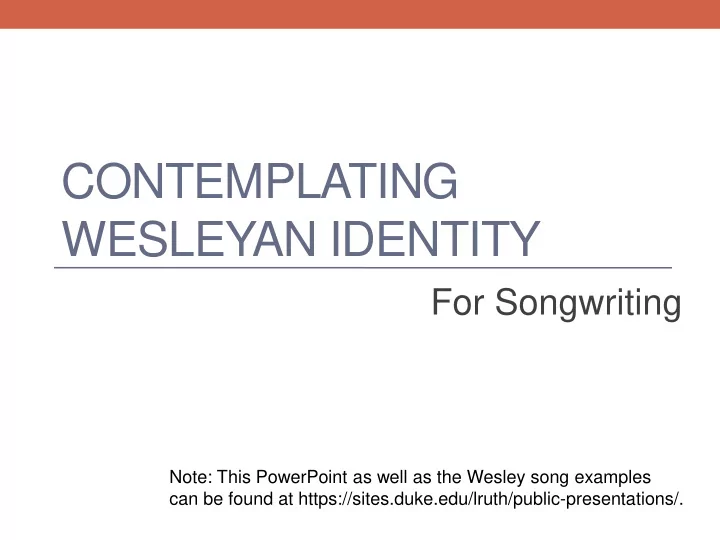

CONTEMPLATING WESLEYAN IDENTITY For Songwriting Note: This PowerPoint as well as the Wesley song examples can be found at https://sites.duke.edu/lruth/public-presentations/.
Where did Wesleyanism come from? Anglicanism Pietism (& Puritanism) Wesleyanism Arminianism (Methodism) Early (Eastern) Church-ism 1600s, 1700s-ish
Wesleyan Distinctives of Doctrine & Piety • The scope of Christ’s work: unlimited atonement (“Whosoever will….”) • Full salvation: justification and sanctification (“God can do more with sin than just forgive it.”) • An experiential and experienced Bible religion (“Let us feel the truth.”) • Centrality of grace, unmerited and unconditional, between persons/Persons (“Thy nature and thy name is Love.”)
Contrasting with Popular Calvinism Wesleyanism Popular Calvinism (TULIP) • Unlimited atonement • T otal depravity • Full salvation • U nconditional election • Experiential • L imited atonement • Centrality of grace • I rresistible grace • P erseverance of the saints • + a controlling image of God as the absolute, complete, holy Sovereign
A Standard Recipe in Many Songs • A dash of popular Calvinism (absolute, complete sovereignty and holiness of God) • A tad of popular Pentecostalism (God acts in overwhelming [helpful] power)
Resulting Common Portrayal • A high, holy, absolutely sovereign God (of love) who • is incomparable as contrasted with us or with the world/creation • overwhelms with power • has acted on our behalf in the past in Christ and especially in his atoning death • grants us to have the resulting (legal) status of that activity (forgiveness and removal of shame)
What Words Are Typically Used in This Portrayal? • Words that emphasize God’s difference to us/the world with respect to size, space, power, and/or character • Adjectives and nouns of magnitude • E.g., awesome, great, mighty, holy, worthy (what else?) • E.g., adjectives ending in – er or -est These are the typical triggers for awe.
Considering Charles Wesley’s Triggers for Awe Generally as Stated Above As Often Seen in Charles Wesley • Unlimited atonement • Paradox #1: juxtaposing the expansive nature of • Full salvation Christ’s work against my • Experiential personal share in it • Centrality of grace • Paradox #2: Christ’s most fully human moments are also his most fully divine ones
Considering Charles Wesley’s Triggers for Awe Generally as Stated Above As Often Seen in Charles Wesley • Unlimited atonement • Experiential #1: collapse time and space between • Full salvation us and biblical events • Experiential • Experiential #2: put us • Centrality of grace into the Biblical story to use scriptural language for the language of our Christian experience
Considering Charles Wesley’s Triggers for Awe Generally as Stated Above As Often Seen in Charles Wesley • Unlimited atonement • The Triune God has gang- tackled the problem of evil • Full salvation and human sin: A full • Experiential Godhead saves a full • Centrality of grace human to the fullest.
Recommend
More recommend